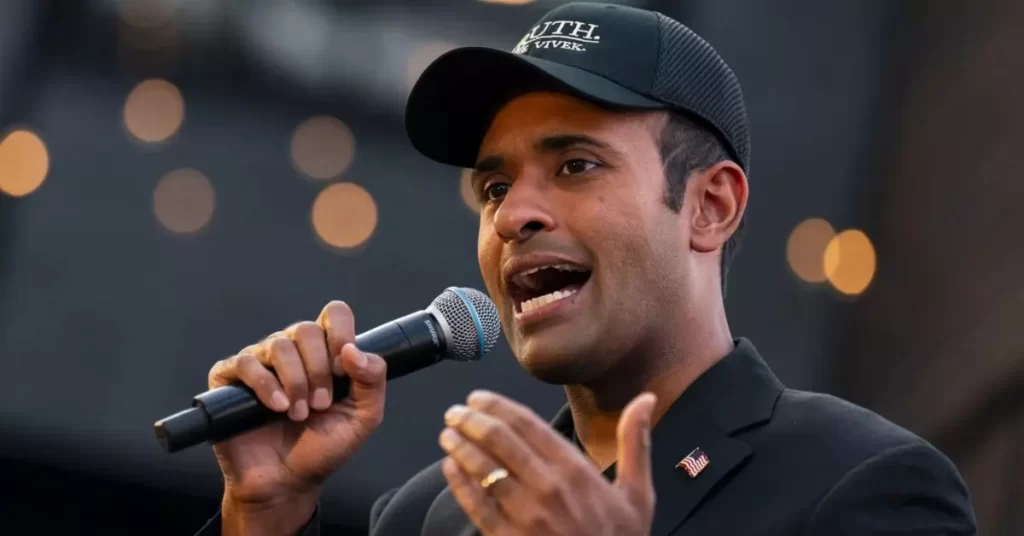Vivek Ramaswamy Knocks Mike Pence : Advocates for Distinction Between Bad Judgment and Crime in Donald Trump’s Actions
Byline: Dilip Singh Parhar
Publishing Date: 29 August, 2023
In the intricate web of events surrounding the 2020 U.S. Presidential election, one name has emerged as a staunch advocate for a clear differentiation between bad judgment and criminal behavior: Vivek Ramaswamy. In his compelling book, “Nation of Victims: Identity Politics, the Death of Merit, and the Path Back,” Ramaswamy fearlessly critiques former President Donald Trump’s refusal to accept the election results. However, what sets his analysis apart is his unwavering focus on separating political misjudgments from genuine criminal acts, a perspective that has gained traction and sparked crucial debates about accountability, justice, and the delicate balance between political decisions and legal consequences in a democracy.
At the heart of Ramaswamy’s analysis lies January 6, 2021, a day etched in the collective memory of the nation as a “dark day for democracy.” Within the pages of his book, Ramaswamy paints a vivid picture of the aftermath of the 2020 election, highlighting Trump’s refusal to concede, his claims of a stolen election, the significant funds raised from loyal supporters, and the contemplation of running for executive office once more. These concerns, eloquently expressed in his book, underscore his deep apprehensions about the state of the nation’s democratic processes.
Ramaswamy’s critique did not remain confined to the pages of his book; it found its voice on social media platforms, particularly Twitter. Just a week after the fateful events of January 6th, he took to Twitter to condemn Trump’s actions unequivocally, declaring, “What Trump did last week was wrong. Downright abhorrent. Plain and simple.” This public denouncement showcased his commitment to holding those in power accountable for their actions, even if they were a former president.
In a recent interview, Ramaswamy elaborated on his views, emphasizing the critical distinction between bad judgment and criminal acts. When questioned about his book and his current stance on the events of January 6, he asserted that he would have made vastly different decisions than Trump did that day. However, he clarified that making a poor judgment does not necessarily translate into criminal behavior.
Ramaswamy expressed profound concerns about the legal implications faced by Trump, including federal charges and charges in Georgia, for allegedly attempting to manipulate the 2020 election results. He cautioned against overreach, arguing that criminalizing bad judgments could erode trust not only in elections but also in the justice system itself, the bedrock of any functioning democracy. According to Ramaswamy, such overreach could undermine the very foundations of democracy, leading to a lack of faith in the justice system’s ability to differentiate between genuine crimes and political misjudgments.
What sets Ramaswamy’s perspective apart is his nuanced understanding of the role played by key figures during the January 6th events, notably former Vice President Mike Pence. Pence found himself in a precarious position, allegedly asked by Trump, in his capacity as vice president, to reject electoral votes multiple times following the 2020 election, including a significant interaction on Christmas Day. Pence’s role in these events has been a subject of immense scrutiny, raising questions about his decisions and the ethical dilemmas he faced.
Ramaswamy’s analysis sheds light on Pence’s predicament and the challenges he encountered during this turbulent period. While some argue that Pence should have taken a firmer stand against Trump’s demands, others empathize with the difficult position he found himself in. The nuanced examination of Pence’s actions adds depth to the ongoing conversation about accountability and responsibility in the realm of politics.
In his interview, Ramaswamy reiterated his views, emphasizing the importance of distinguishing between Trump’s handling of the January 6 events and his responsibility for them. He acknowledged the prevalence of censorship, highlighting how pervasive censorship might have played a role in the events of that day. However, he remained steadfast in his belief that censorship does not absolve Trump of his lack of respectable conduct during the crisis. For Ramaswamy, these are two distinct issues requiring separate analysis, a perspective that challenges prevailing narratives and encourages a more nuanced understanding of the complex dynamics at play.
Additionally, Ramaswamy shed light on the frustration experienced by many supporters of the former president. He pointed to a combination of factors, including stringent COVID-19 restrictions, social media platforms like Twitter suppressing stories, such as the one about Hunter Biden’s laptop, and more. According to Ramaswamy, these elements contributed to the widespread dissatisfaction and disillusionment among Trump’s supporters, creating an environment ripe for political unrest.
Ramaswamy’s nuanced perspective on the events of January 6, 2021, and Trump’s actions challenges conventional narratives, urging society to critically examine the actions of those in power without compromising the integrity of the justice system. His insights prompt essential conversations about accountability, justice, and the delicate balance between political decisions and legal consequences in a democracy.
Moreover, his focused analysis of Mike Pence’s role adds depth to the ongoing discourse, highlighting the ethical complexities faced by individuals in positions of power during moments of crisis. As the nation grapples with the aftermath of January 6th, Ramaswamy’s perspective serves as a beacon, guiding discussions toward a more comprehensive understanding of the events that shook the foundations of American democracy.



